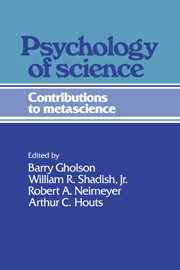Book contents
- Frontmatter
- Contents
- Preface
- Contributors
- 1 The psychology of science: An introduction
- Part I Historical issues in the psychology of science
- Part II The case for a psychology of science
- Part III Creativity and the psychology of science
- Part IV Cognition in the psychology of science
- Part V Social factors in the psychology of science
- Part VI Epilogue and Prologue
- Author index
- Subject index
Part III - Creativity and the psychology of science
Introduction to creativity in science
Published online by Cambridge University Press: 05 June 2012
- Frontmatter
- Contents
- Preface
- Contributors
- 1 The psychology of science: An introduction
- Part I Historical issues in the psychology of science
- Part II The case for a psychology of science
- Part III Creativity and the psychology of science
- Part IV Cognition in the psychology of science
- Part V Social factors in the psychology of science
- Part VI Epilogue and Prologue
- Author index
- Subject index
Summary
Creativity has been one of the most difficult human faculties to investigate systematically. Nearly everyone has a favorite story that illustrates how a creative solution to a difficult problem seemed to emerge from a chaotically organized assortment of clues, all of which seemed to defy systematicity. In the context of science, philosophers have essentially abandoned the unruly problem of creativity. McGuire (Chapter 8) aptly points out, for example, that the problem of verifying (testing) the validity of a scientific hypothesis has received intense philosophical inquiry and is perhaps overemphasized in scientific methods courses. In contrast, the problem of discovering or generating a scientific hypothesis involves creative processes which have generally been outside of the provinces of philosophy and methods courses.
Fortunately, there are some who have attempted to understand creativity in science. Historians, for example, have documented some of the creative processes and accomplishments of famous scientists. Sociologists have identified social, political, and cultural forces that either encourage or discourage creativity. Creativity has been a direct object of inquiry in psychology for at least a century. Consequently, psychologists have identified some of the regularities and mechanisms that underly the creative process. The three chapters in this section (by Simonton, McGuire, and Gruber) represent some of psychology's recent contributions. It would not be surprising if psychology were to take a leadership role in the interdisciplinary metascience arena when it comes to identifying creative processes in science.
- Type
- Chapter
- Information
- Psychology of ScienceContributions to Metascience, pp. 165 - 169Publisher: Cambridge University PressPrint publication year: 1989



